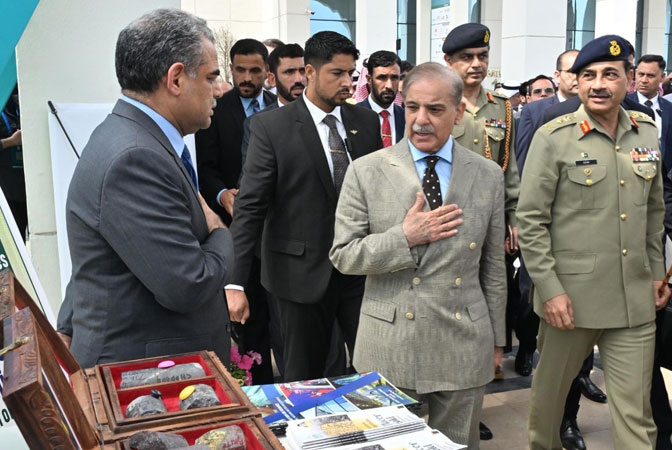 Prime Minister Shehbaz Sharif on Tuesday invited Saudi Arabia, China, the EU, United States and other countries to invest in Pakistan’s vast mineral sector, as the country seeks international financing for its natural reserves estimated to be worth $6 trillion.
Prime Minister Shehbaz Sharif on Tuesday invited Saudi Arabia, China, the EU, United States and other countries to invest in Pakistan’s vast mineral sector, as the country seeks international financing for its natural reserves estimated to be worth $6 trillion.
Pakistan’s mineral sector, despite rich reserves including salt, copper, gold, and coal, contributes only 3.2 percent to the GDP and 0.1 percent to global mineral exports. Pakistan is hoping to tap the sector’s underutilized potential and is currently hosting the second annual Pakistan Minerals Investment Forum, with government officials and heads of private sector companies from Saudi Arabia, China, the US and a host of other nations in attendance.
Pakistan is home to one of the world’s largest porphyry copper-gold mineral zones, while the Reko Diq mine in southwestern Balochistan has an estimated 5.9 billion tons of ore. Barrick Gold, which owns a 50 percent stake in the Reko Diq mines, considers them one of the world’s largest underdeveloped copper-gold areas, and their development is expected to have a significant impact on Pakistan’s struggling economy. “Here we have our brothers from Saudi Arabia, from Qatar, from UAE and other countries, and of course, ambassadors from Europe and North America and Far East, China,” Sharif said in his address at the mineral summit.
“I think this is an opportunity which we must convert into reality, not through borrowing more loans, but coming up with feasibilities and solid evidence of partnership which will result into a win-win partnership.
“Today there is a dearth of rare earth material around the globe and I would like to invite, on my behalf, on behalf of my government and provincial governments, all potential investors in Pakistan and abroad … We can certainly convert this into an opportunity like never before.”
During a panel discussion at the forum, Abdulrahman AlBelushi, Saudi Arabia’s deputy minister for mineral resources management, said the Kingdom wanted to achieve “new heights and new opportunities” in the minerals sector in partnership with Pakistan. “A lot of expertise is shared and aligned between these two nations,” AlBelushi said.
“[Attending the summit] we have the CEO of the Saudi Geological Survey, the CEO of the National Mineral Program, we have representatives from the Ministry of Investment, representatives from the Saudi Fund for Development and the EXIM Bank of Saudi Arabia.”
Pakistan is also expected to unveil a new National Minerals Harmonization Framework 2025 at the minerals summit, with the PM highlighting future policy changes, including that the country would not allow raw materials to be shipped but investors would need to install industries in the country to export finished products.
“From today onwards, it has to be a very integrated policy where you mine raw materials, have a downstream industry, convert them into finished and semi-finished goods, and then export them out,” Sharif said.
The prime minister said Pakistan’s deposits of natural resources were worth trillions of dollars, which it needed to “harvest” to escape a prolonged economic crisis, which has pushed it to engage in 25 IMF bailout programs since joining the fund, with the most recent being a $7 billion loan approved in September 2024.
Separately, Chief of Army Staff General Syed Asim Munir has said Pakistan is ready to emerge as a leader in the global mineral economy.
Addressing the forum, he said Pakistan welcomes international institutions to introduce their expertise, explore investment opportunities, and partner with the country in developing its vast resource potential.
The Army Chief emphasized that Pakistan needs engineers, geologists, operators and skilled mining professionals to harness its mineral wealth. That is why, students are being sent abroad for training to advance this sector.
He said currently, twenty-seven Pakistani students from Balochistan are receiving training in mineral exploration in Zambia and Argentina. He said the goal is to develop a strong workforce, expertise,and human resources for the mineral sector.
General Syed Asim Munir further said economic security has become a critical component of national security. He assured that the Pakistan Army would ensure a robust security framework and proactive measures to safeguard the interests and trust of partners and investors.
He also emphasized that the development of upstream and downstream mineral industries in Pakistan will be prioritized.
The Army Chief stressed the importance of investing in refining and value addition in Pakistan to optimize costs and diversify markets. He said with vast mineral reserves beneath the feet of the Pakistani people, skills in their hands and a transparent mineral policy in place, there is no room for despair or inaction.
He urged the people to move forward and strive for both their country and themselves. General Syed Asim Munir reaffirmed that Pakistanis collectively assure their partners and investors that utilizing their expertise for business and mineral wealth extraction is a national aspiration. He emphasized Pakistan can be trusted as a reliable partner with confidence.
The Army Chief also acknowledged the efforts of Baloch tribal elders, who have played a crucial role in promoting mining activities and advancing the development of Balochistan. He remarked that through collaboration, Pakistan’s mineral sector can foster regional development, prosperity and sustainability for collective benefit.